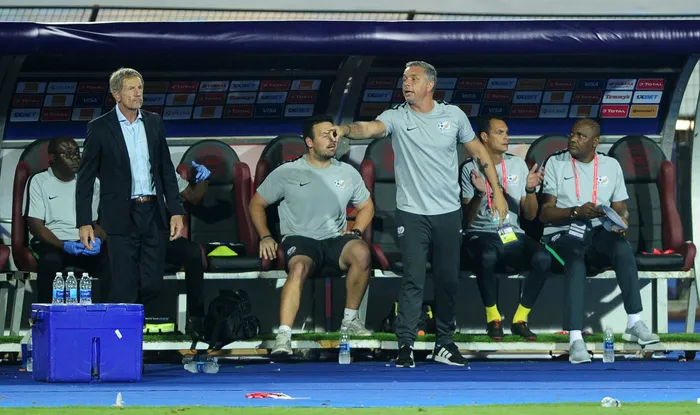Mark Fish hails Bafana Bafana’s resurgence while reliving his own golden era
#BAFANA_FRIDAYS

Mark Fish shouts instructions form the Bafana Bafana bench during the 2019 Afcon Finals last 16 match between Egypt and South Africa.
Image: BackpagePix
Mark Fish was one in a million. He didn’t carve out an illustrious career from the mid to late ’90s, but he partied as hard as he worked on the pitch.
A career path honed in the parks of Arcadia in Pretoria took Fish to the limelight of top-flight club Jomo Cosmos. That became the breakthrough he needed, as he spent only one season at Ezenkosi before moving to Soweto giants Orlando Pirates in 1993.
In a club that was largely Black-dominated, Fish overcame that barrier to instantly become one with the team. He didn’t rely on handouts; instead, he let his game do the talking and established himself.
And boy, it did. He won the league title in his debut season at the club, etching his name among the hard-nosed defenders of the league thanks to his work ethic, resilience and aggression.
That was the perfect foundation for Fish and his teammates to build on. They returned to Africa and conquered, winning the club’s maiden – and only – CAF Champions League crown in 1995.
Fish’s tactical acumen caught the eye of national team coach Clive Barker, and under his tutelage, Fish and his teammates celebrated the national team’s four-year re-admission into international football with their maiden Africa Cup of Nations title on home soil in 1996.
Another historic moment beckoned. He was part of the Bafana squad that qualified for their first FIFA World Cup in 1998 — a full-circle achievement that Fish still reflects on with nothing but pride, even years after hanging up his boots, and still celebrated far and wide.
“It was exciting times in South Africa,” recalled Fish after being inducted into the SA Hall of Fame alongside the late Barker, some of his Bafana teammates and Banyana Banyana’s legendary captain, Janine van Wyk, in early November.
“We were re-admitted in 1992. At Pirates, we won the league in 1994, and a year later we won the Champions League. Then a year later, I won AFCON with Bafana. In 1998, we then qualified for the World Cup.
“I was very fortunate to be part of that football journey that South Africa was busy telling at the time, obviously with my teammates and the late Clive Barker.
“The best thing for me is to remember the players from the 1970s and 1980s who took the chance to represent our country. So I am always reminded of that when I look back at my time with Pirates and the national team.”
Fish is not only reminded of the good days, but also of his ability to overcome obstacles. He worked hard to put Pirates and Bafana on the map, and he celebrated his triumphs enthusiastically.
The 51-year-old recalled once missing national team training the day after celebrating their Mandela Cup victory. Barker summoned him to his hotel room and simply asked: “Did you enjoy it?” It was a moment that strengthened their bond as he understood that it could have easily ended his career if Barker was someone else.
It was experiences like those that forced Fish, when he later joined Lazio in Serie A and then Bolton Wanderers, Charlton Athletic and Ipswich Town in the English Premier League, to reconsider some of his life choices.
“I am grateful for the fact that I took the step to go and play in Europe,” Fish said. “I think there I had to change my ways, and I calmed down quite a lot.
“You get to a point in your football career where you ask yourself: ‘How far do you want to go?’ If you are disciplined enough, you’ll go far. When I left South Africa for Italy, I had to become more professional and take my career seriously.”
Fish took his career seriously, and he’s pleased with the rewards it brought him. That’s why he’s a happy older man watching the current crop of youngsters take their careers seriously and put smiles back on the faces of South Africans.
Yes, Bafana have restored the nation’s pride in recent months. They recently qualified automatically for the World Cup for the first time since the 2002 edition in South Korea/Japan.
And that’s not all. They are fast returning to being continental heavyweights, following their podium finish in the last AFCON — their first since 1998 — and qualifying for the upcoming showpiece in Morocco next month without a loss in the qualifiers.
Though Fish is pleased with the similarities between the current crop and his own generation — including having a coach who brings tactical and technical prowess as well as long-term camaraderie — he hopes they can do things differently.
“I hope that they can do it the other way around — where they’ll come first or second after finishing third,” said Fish, referring to the second- and third-place finishes at the 1998 and 2000 AFCONs after winning the crown in 1996. “But at the moment, it seems it will be like that.
“Why you make comparisons is because we’ve had a coach now for at least four years, and a consistent team, though new players come in and out as the team evolves.
“They are playing for themselves, the coach and the country. We as South Africans are proud to watch Bafana again. Long may it continue. This is a team that I think will go to the World Cup and get out of the group stage.
“More importantly, they’ll go to AFCON now knowing that they’ve raised the standard after losing in the semi-final. So expectations will come from themselves first. We also expect them to do well.”
Related Topics: